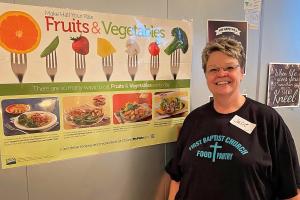While the goal of food pantries is always to provide food to all in need, it is also important to provide it in such a way that help guests feel welcome and in control. First Baptist Church Food Pantry in Canton recently converted their layout, policies, and visuals to give guests a shopping experience that more closely resembles a grocery store. University of Illinois Extension, Supplemental Nutrition Assistance Program-Education (SNAP-ED) staff were part of the team of supporters to make this new format a reality.
Fulton-Mason-Peoria-Tazewell Unit SNAP-Ed instructor Krista Gray has provided nutrition education to the food pantry guests for the past couple of years. More recently, Kaitlyn Streitmatter, educator, and Rebecca Crumrine, program coordinator, connected with the new pantry manager, Julie Henderson, to help her achieve her ideas for how to enhance the work already being done at the pantry.
“We provided guidance on set up and offered visuals and what we call ’nudges’,” mentioned Rebecca. “We recommend using ‘nudges’ to help guests select healthier food items. When we place healthier items earlier in line, bundle food items that go together in a recipe next to each other, separate the shopping experience by food group, and use visuals like bright colored posters and shelf labels, shoppers are more likely to select and eat healthier foods.”
“My goal is to feed the body, soul, and spirit of our patrons through our food pantry ministry.” explained Julie.
“Julie was passionate about the project and worked to make this vision a reality,” Rebecca stated. “She reached out to others in the community to join the effort.” Layout of the entire pantry was updated through work by the First Baptist Church, in addition to the purchase of shopping carts. Shelves were donated by Graham Hospital, and Dollar General donated additional shopping carts.
At the end of January, First Baptist Church officially changed to a client choice, shopping style pantry. This format benefits both the pantry and the guests. Pantries can identify and meet the guests needs, reduce overhead & food waste, build a stronger bond with the guests, and even help to nudge healthier items through placement and visuals. Guests can preserve their dignity as they get to choose their foods as well as select items they need to help manage health conditions such as diabetes, high blood pressure, intolerances and allergies.
SNAP-Ed continues to work with First Baptist Church Food Pantry in the form of nutrition education to the clients, further guidance on the pantry, and additional resources such as signage.
According to Feeding America’s Map the Meal Gap, Fulton County has a higher than normal food insecurity rate. Open every Monday, First Baptist Church Food Pantry in Canton plays an instrumental role in addressing the needs of local families. They serve an average of 225 households weekly through their pantry, help the new Canton High School Pantry, and pack buddy bags for the Canton elementary schools.
To learn more about programs offered by University of Illinois Extension, upcoming events, and educational information visit them online at web.extension.illinois.edu/fmpt.
Source - Rebecca Crumrine, SNAP-Ed program coordinator, racrumri@illinois.edu
